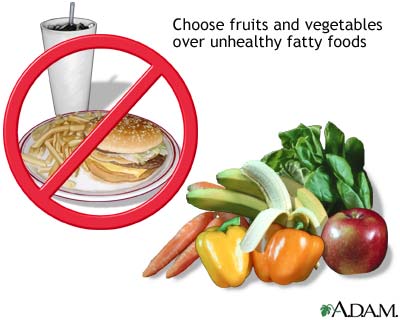Health Topics
People often do not consider heart disease a woman's disease. Yet cardiovascular disease is the leading killer of women over age 25. It kills nearly twice as many women in the United States as all types of cancer.
Men have a greater risk for heart disease earlier in life than women. Women's risk increases after menopause.
EARLY HEART DISEASE SIGNS
Women may have warning signs that go unnoticed for weeks or even years before a heart attack occurs.
- Men most often have the "classic" heart attack signs: tightness in the chest, arm pain, and shortness of breath.
- Women's symptoms can resemble those of men.
- Women may also report other symptoms, such as nausea, fatigue, indigestion, anxiety, and dizziness.
ACT IN TIME
Recognizing and treating a heart attack right away improves your chance for survival. On average, a person having a heart attack will wait for 2 hours before calling for help.
Know the warning signs and always call 911 or the local emergency number within 5 minutes of when symptoms begin. By acting quickly, you can limit damage to your heart.
MANAGE YOUR RISK FACTORS
A risk factor is something that increases your chance of getting a disease or having a certain health condition. You can change some risk factors for heart disease. Other risk factors you cannot change.
Women should work with their health care provider to address risk factors they can change.
- Use lifestyle measures to keep your blood cholesterol levels in the right range. Targets for cholesterol levels vary, depending on your risk factors. Ask your provider which targets are best for you.
- Keep your blood pressure in a healthy range. Your ideal blood pressure level will depend on your risk factors. Discuss your target blood pressure with your provider.
Estrogen is no longer used to prevent heart disease in women of any age. Estrogen may increase the risk for heart disease in older women. However, it may still be used for some women to treat hot flashes or other medical problems.
- Estrogen use is probably safest for women under age 60.
- It should be used for the shortest possible period of time.
- Only women who have a low risk for stroke, heart disease, blood clots, or breast cancer should take estrogen.
LIVE A HEALTHY LIFESTYLE
Some of the risk factors for heart disease that you CAN change are:
- Do not smoke or use tobacco.
- Get plenty of exercise. Women who need to lose weight or maintain their weight should get at least 60 to 90 minutes of moderate-intensity exercise on most days. To maintain your health, get at least 30 minutes of exercise a day, preferably at least 5 days a week.
- Maintain a healthy weight. Women should strive for a body mass index (BMI) of 18.5 to 24.9 kg/m2 and a waist smaller than 35 inches (90 cm).
- Get checked and treated for depression, if necessary.
- Women with high cholesterol or triglyceride levels may benefit from omega-3 fatty acid supplements. Ask your provider if they are right for you.
If you drink alcohol, limit yourself to no more than one drink per day. Do not drink just for the purpose of protecting your heart.
Good nutrition is important to your heart health, and it will help control some of your heart disease risk factors.

- Eat a diet that is rich in fruits, vegetables, and whole grains.
- Choose lean proteins, such as chicken, fish, beans, and legumes.
- Eat low-fat dairy products, such as skim milk and low-fat yogurt.
- Avoid sodium (salt) and fats found in fried foods, processed foods, and baked goods.
- Eat fewer animal products that contain cheese, cream, or eggs.
- Read labels, and stay away from "saturated fat" and anything that contains "partially-hydrogenated" or "hydrogenated" fats. These products are most often high in unhealthy fats.
Alternative Names
CAD - women; Coronary artery disease - women
References
Centers for Disease Control and Prevention website. About women and heart disease. www.cdc.gov/heart-disease/about/women-and-heart-disease.html. Updated May 15, 2024. Accessed July 23, 2024.
Gulati M, Merz CNB. Cardiovascular disease in women. In: Libby P, Bonow RO, Mann DL, Tomaselli GF, Bhatt DL, Solomon SD, eds. Braunwald's Heart Disease: A Textbook of Cardiovascular Medicine. 12th ed. Philadelphia, PA: Elsevier; 2022:chap 91.
Mora S, Libby P, Ridker PM. Primary prevention of cardiovascular disease. In: Libby P, Bonow RO, Mann DL, Tomaselli GF, Bhatt DL, Solomon SD, eds. Braunwald's Heart Disease: A Textbook of Cardiovascular Medicine. 12th ed. Philadelphia, PA: Elsevier; 2022:chap 25.
The 2022 Hormone Therapy Position Statement of The North American Menopause Society Advisory Panel. The 2022 hormone therapy position statement of The North American Menopause Society. Menopause. 2022;29(7):767-794. PMID: 35797481 pubmed.ncbi.nlm.nih.gov/35797481/.
Virani SS, Newby LK, Arnold SV, et al. 2023 AHA/ACC/ACCP/ASPC/NLA/PCNA guideline for the management of patients with chronic coronary disease: a report of the American Heart Association/American College of Cardiology Joint Committee on Clinical Practice Guidelines. J Am Coll Cardiol. 2023;82(9):833-955. PMID: 37480922 pubmed.ncbi.nlm.nih.gov/37480922/.
Review Date 7/14/2024
Updated by: Michael A. Chen, MD, PhD, Associate Professor of Medicine, Division of Cardiology, Harborview Medical Center, University of Washington Medical School, Seattle, WA. Also reviewed by David C. Dugdale, MD, Medical Director, Brenda Conaway, Editorial Director, and the A.D.A.M. Editorial team.







